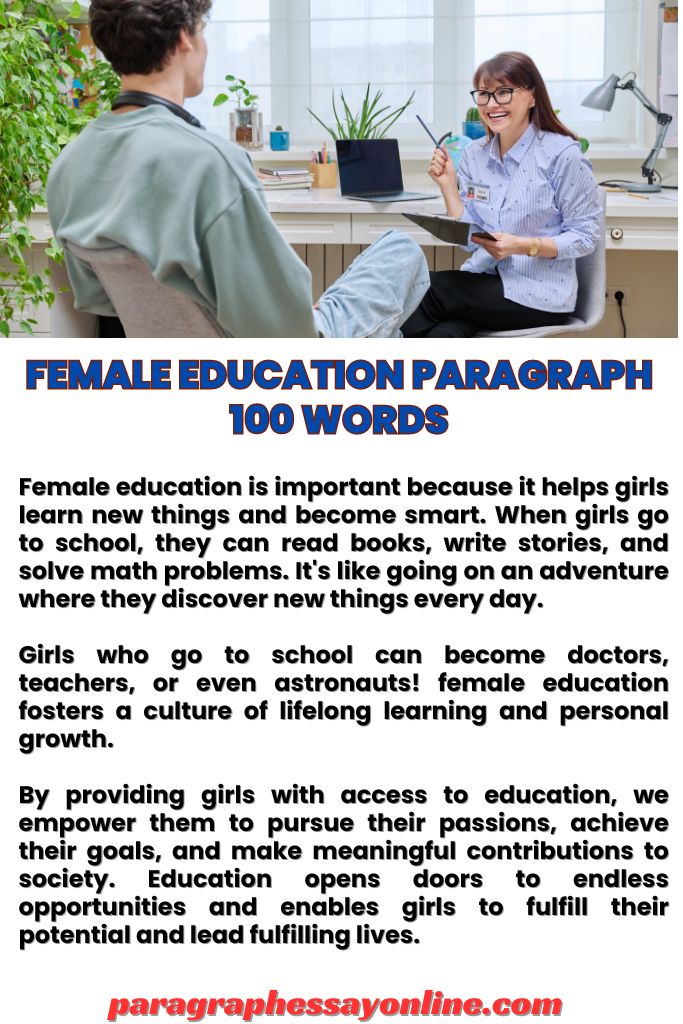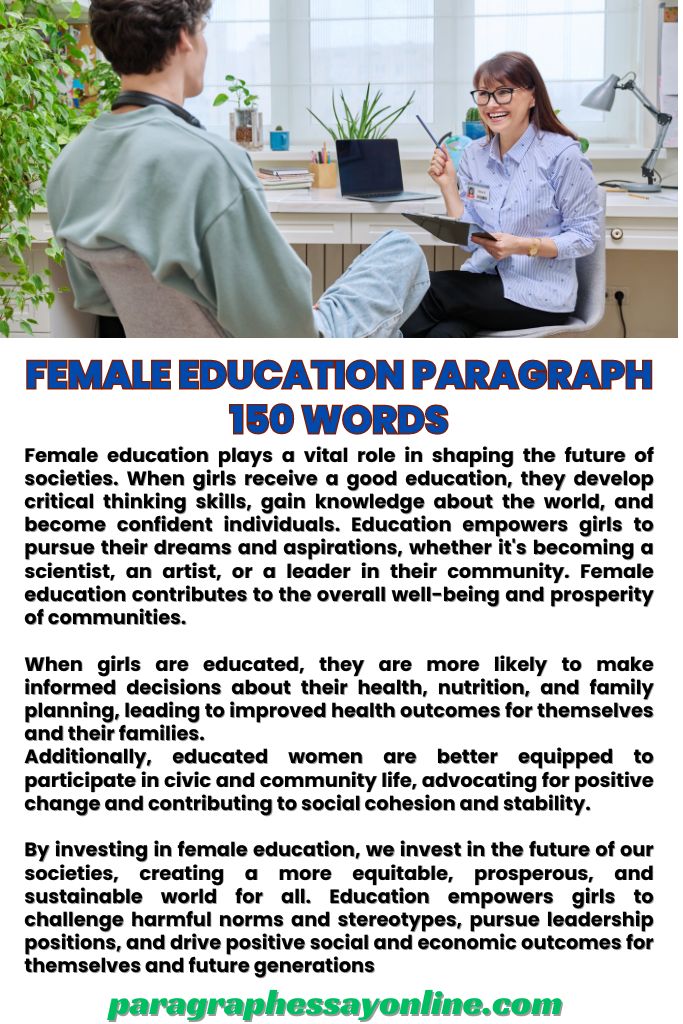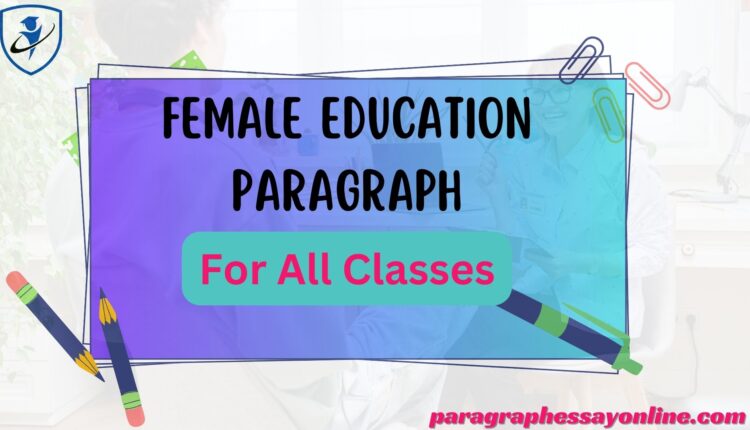Female Education Paragraph
Female Education Paragraph For All Classes (1-12)
Female education is crucial for the progress and empowerment of societies worldwide. By providing girls with access to quality education, we ensure that they have the knowledge, skills, and opportunities to reach their full potential and contribute positively to their communities and the world.
Female Education Paragraph 100 Words For 1, 2, 3 Students
Female education is important because it helps girls learn new things and become smart. When girls go to school, they can read books, write stories, and solve math problems. It’s like going on an adventure where they discover new things every day.
Girls who go to school can become doctors, teachers, or even astronauts! female education fosters a culture of lifelong learning and personal growth. By providing girls with access to education, we empower them to pursue their passions, achieve their goals, and make meaningful contributions to society. Education opens doors to endless opportunities and enables girls to fulfill their potential and lead fulfilling lives.

Female Education Paragraph 150 Words For 4 And 5 Students
Female education plays a vital role in shaping the future of societies. When girls receive a good education, they develop critical thinking skills, gain knowledge about the world, and become confident individuals. Education empowers girls to pursue their dreams and aspirations, whether it’s becoming a scientist, an artist, or a leader in their community. Female education contributes to the overall well-being and prosperity of communities. When girls are educated, they are more likely to make informed decisions about their health, nutrition, and family planning, leading to improved health outcomes for themselves and their families.
Additionally, educated women are better equipped to participate in civic and community life, advocating for positive change and contributing to social cohesion and stability. By investing in female education, we invest in the future of our societies, creating a more equitable, prosperous, and sustainable world for all. Education empowers girls to challenge harmful norms and stereotypes, pursue leadership positions, and drive positive social and economic outcomes for themselves and future generations.

Female Education Paragraph 200 Words For 6, 7, 8 Students
Female education is a cornerstone of societal progress and equality. When girls have access to education, they unlock a world of opportunities for personal and academic growth. Beyond the classroom, female education fosters critical thinking skills, nurtures creativity, and empowers girls to become leaders in their communities. Moreover, education equips girls with the knowledge and skills to pursue careers in various fields, from science and technology to arts and humanities.
By investing in female education, we invest in a brighter future for all, where every girl has the chance to reach her full potential and contribute positively to society. The importance of female education cannot be overstated. Education empowers girls to challenge stereotypes, advocate for their rights, and pursue their dreams. In addition to academic knowledge, female education promotes social and emotional intelligence, resilience, and self-confidence. Furthermore, educated women are more likely to engage in lifelong learning and continue their education beyond secondary school.
By prioritizing female education, we create a more inclusive and equitable society where all individuals have the opportunity to thrive and succeed. Female education is a fundamental human right and a catalyst for positive change. When girls are educated, they have the tools to break the cycle of poverty, improve their health and well-being, and contribute to economic development.
Paragraph On Female Education 250 Words For 8,9,10 Students
Female education is a cornerstone of societal progress and gender equality. When girls have access to quality education, they acquire the knowledge, skills, and confidence to pursue their aspirations and contribute meaningfully to their communities. Female education fosters critical thinking, problem-solving, and communication skills, preparing girls for success in various fields. Moreover, educated women are more likely to engage in civic and political participation, advocating for positive change and shaping the future of their societies. By prioritizing female education, we create a more equitable and inclusive world where all individuals have the opportunity to thrive and make a difference.
The importance of female education extends far beyond the classroom. Education empowers girls to challenge stereotypes, break barriers, and pursue their dreams. By investing in girls’ education, we invest in the future of our communities and societies. Moreover, educated women are more likely to contribute to economic development, participate in decision-making processes, and promote social justice. By ensuring equal access to education for all, regardless of gender, we create a more just and prosperous world for everyone.
Female education is a fundamental human right and a powerful tool for social and economic development. When girls are educated, they are better equipped to navigate the complexities of the modern world, make informed decisions, and advocate for their rights. Additionally, education empowers girls to pursue careers in various fields, from STEM to the arts, and become leaders in their communities. By investing in female education, we invest in the future leaders, innovators, and changemakers who will shape our world for the better.
Female Education Paragraph 300 Words For 9, 10, 11, 12 Students
Female education is a critical component of social progress and equality. Access to quality education empowers girls to reach their full potential and contribute meaningfully to society. Beyond the academic realm, female education fosters critical thinking, problem-solving, and leadership skills, preparing girls for success in diverse fields. Moreover, educated women are more likely to engage in civic and political participation, advocating for gender equality and social justice. By prioritizing female education, we not only address gender disparities but also promote economic development and sustainable growth.
Additionally, education enables girls to challenge stereotypes, break barriers, and pursue their passions, whether in STEM fields, the arts, or entrepreneurship. Furthermore, female education plays a crucial role in addressing global challenges such as poverty, hunger, and climate change. Educated women are better equipped to make informed decisions about their health, family planning, and environmental sustainability, leading to improved outcomes for themselves and their communities. Moreover, education empowers girls to become agents of change, driving positive social, economic, and environmental impacts in their communities and beyond. By investing in female education, we invest in a brighter future for all, where every individual has the opportunity to thrive and contribute to a more just, equitable, and sustainable world.
Female education promotes intergenerational benefits, as educated women are more likely to invest in their children’s education and health, leading to improved outcomes for future generations. Furthermore, education equips girls with the knowledge and skills to navigate the complexities of the modern world, including digital literacy, financial literacy, and critical thinking. Moreover, female education contributes to the advancement of science, technology, engineering, and mathematics (STEM) fields by diversifying perspectives and fostering innovation. By supporting female education, we unlock the full potential of half the population, driving progress and prosperity for society as a whole.
Female Education Paragraph 500 Words
Female education is a multifaceted issue with far-reaching implications for individuals, communities, and societies as a whole. By providing girls with access to quality education, we not only ensure their individual empowerment but also contribute to broader social and economic development goals. Education has the power to break the cycle of poverty, improve health outcomes, and promote gender equality, making it a fundamental human right and a cornerstone of sustainable development efforts worldwide.
One of the primary benefits of female education is its impact on economic growth and prosperity. When girls are educated, they are more likely to enter the workforce, earn higher incomes, and contribute to household and national economies. Research has shown that investing in female education yields high returns, with each additional year of schooling for girls leading to a significant increase in GDP growth rates. Additionally, educated women tend to have fewer children and provide better care and education for their families, leading to improved health and well-being outcomes for future generations.
Furthermore, female education is essential for achieving gender equality and social justice. Education empowers girls to challenge discriminatory norms and practices, advocate for their rights, and participate fully in political, economic, and social life. By promoting girls’ education, we can address root causes of gender-based discrimination and violence, creating more inclusive and equitable societies for all. Moreover, educated women are more likely to marry later, have healthier children, and participate in decision-making processes within their families and communities.
Female education has a ripple effect on societal norms and values, challenging traditional gender roles and promoting gender equality. Educated women serve as role models for future generations, inspiring other girls to pursue their dreams and aspirations. Additionally, education provides girls with a platform to advocate for their rights and address issues such as child marriage, gender-based violence, and discrimination. By empowering girls through education, we create a more inclusive and equitable society where all individuals have the opportunity to thrive and contribute to positive social change. Investing in female education is not only morally imperative but also essential for sustainable development and global progress.
Additionally, female education plays a critical role in promoting environmental sustainability and addressing global challenges such as climate change and biodiversity loss. Educated women are more likely to adopt sustainable practices, such as family planning and resource conservation, leading to reduced environmental degradation and increased resilience to environmental shocks. By empowering girls with knowledge and skills to address environmental issues, we can create a more sustainable and resilient future for all.
In conclusion, female education is not only a matter of social justice and human rights but also a strategic imperative for achieving sustainable development goals. By investing in girls’ education, we can unlock their full potential, unleash their creativity and innovation, and build a more prosperous, equitable, and sustainable world for present and future generations. As global citizens, we must prioritize female education and ensure that all girls have access to quality education, regardless of their background or circumstances.
Frequently Asked Questions For Female Education Paragraph
1. Why is female education important?
Answer: Female education is crucial for achieving gender equality and empowering women to participate fully in social, economic, and political life. It helps break the cycle of poverty, improves health outcomes, and promotes sustainable development.
2. What are the benefits of educating girls?
Answer: Educating girls has numerous benefits, including increased economic opportunities, improved health and well-being, reduced child mortality rates, and greater gender equality. Educated women are also more likely to contribute to the prosperity and stability of their communities.
3. How does female education contribute to societal progress?
Answer: Female education fosters critical thinking, leadership skills, and empowerment among women and girls. It enables them to challenge social norms and stereotypes, advocate for their rights, and participate in decision-making processes, leading to positive social change and greater equality.
4. What are the barriers to female education?
Answer: Barriers to female education include cultural norms and practices, poverty, lack of access to schools and resources, child marriage, and gender-based violence. Addressing these barriers requires concerted efforts from governments, communities, and international organizations.
5. How can I support female education?
Answer: You can support female education by advocating for policies that promote gender equality in education, supporting organizations that provide scholarships and resources to girls, volunteering as a mentor or tutor, and raising awareness about the importance of educating girls. Together, we can create a more inclusive and equitable world where every girl has the opportunity to fulfill her potential through education.
